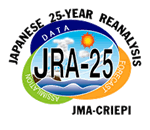

December, 2008 updated
The Japan Meteorological Agency (JMA) conducted the Japanese 25-year ReAnalysis (JRA-25) in collaboration
with the Central Research Institute of Electric Power Industry (CRIEPI) and produced
high quality meteorological datasets for seasonal prediction models and climate
research use.
JRA-25 Overview |
||
|
|
||
|
|
||
|
|
||
|
|
||
|
|
||
| In
addition, SSM/I PW, and TOVS radiance level 1c (SSU) and 1d (HIRS, MSU) were
assimilated. |
||
|
|
||
| Wind profile retrievals surrounding tropical cyclones (TCR), SSM/I snow coverage, digitized Chinese snow depth data, reprocessed GMS-AMV | ||
|
|
||
| Daily COBE SST and sea ice (Ishii
2005, IJC), daily 3D-ozone profile |
||
Observation availability in JRA-25 |
||||
|
|
Forecast Score for JRA-25 ( Z500 FT=24 RMSE ) |
||||
|
|
Application of JRA-25 for operation and research |
||||
|
|
Comparison between JRA-25 and other reanalyses |
| Name | Organization | Period | Resolution | Assimilation | Memorandum |
| JRA-25 | JMA/CRIEPI | 1979-2004 | T106L40 | 3DVAR | continues as JCDAS since 2005 |
| ERA-15 | ECMWF | 1979-1993 | T106 L31 | OI | completed in 1996 |
| ERA-40 | ECMWF | 1957.9-2002.8 | TL159 L60 | 3DVAR | completed in 2003 |
| NCEP-NCAR(Reanalysis-1) | NCEP-NCAR | 1948-present | T62 L28 | 3DVAR | continues as CDAS |
| NCEP-DOE AMIP-II(Reanalysis-2) | NCEP-DOE | 1979-present | T62 L28 | 3DVAR | continues as CDAS |
| GEOS1 | NASA/DAO | 1980-1996 | 2x2.5 L20 | OI + IAU | completed up to 1996 |
T: Triangular truncation, TL: Triangular with Linear reduced Gaussian grid, L: Vertical layers.
T106 and TL159 are comparable to a lat-lon grid with intervals of about 110km, while T62 is comparable to the same with intervals of about 180km.
Definition of vertical levels for the model used in JRA-25 and JCDAS
Back to Top Page -->